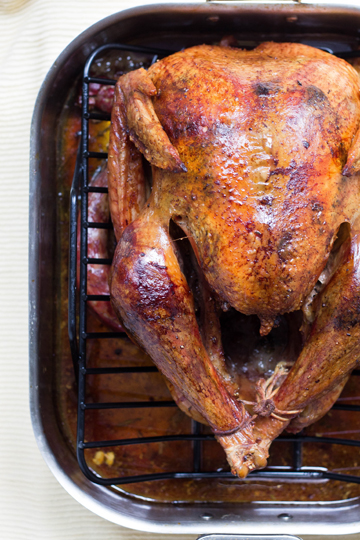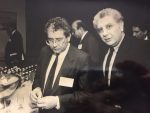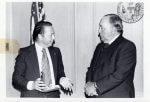An Arab American Thanksgiving
By Ray Hanania
One of the greatest contributions of the Arab World to the Western World is the gift of Arab food, especially in America where the national menu has grown as a result of the arrival of immigrants from around the world.
One of the most important food holidays in America is Thanksgiving, a celebration that commemorates the moment when European pilgrims met with native Indian tribes and shared a dinner together.
The dinner came at a time of the Fall harvest, to give thanks for the bounty of food harvested during the past year.
The American Thanksgiving traces back to 1619 in Charles County, Virginia where the pilgrims gave thanks for the arrival of 39 English settlers to the settlement.
It was reinforced in American history with the story of 1621 in which pilgrims shared a harvest meal with the local the Wampanoags and Patuxet Indian tribes to reinforce an alliance of protection against another hostile Indian tribe called the Narragansett Indians.
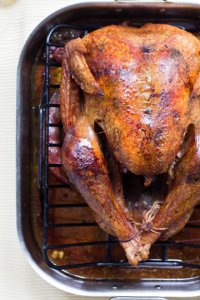
Although Thanksgiving was celebrated in America in various ways, President Abraham Lincoln declared Thanksgiving to be a national holiday in 1863 and eventually was declared to take place ont hre fourth Thursday of November each year.
In celebration, millions of American families will be enjoying a dinner featuring a Turkey as the main course to celebrate Thanksgiving, because the wild turkey is what was first shared by the Indians and pilgrims.
That tradition has continued for years but has slowly transformed as the nation’s immigrant population grew. Each immigrant population would add their own food to the Thanksgiving Dinner menu, an act that symbolized how people from other countries had come to embrace the American way of life.
Arab immigrants from the Middle East were no different. They merged their foods with to create a unique Thanksgiving dinner experience.
Thanksgiving dovetails nicely with Arab culture because nothing empowers peace and understanding more than when people of different backgrounds and faith share a dinner together. The dinner opens a door to familiarity, understanding and to friendship, all of the ingredients that lead to co-existence.
Being Arab and Palestinian, Arab food has always been a part of my family’s celebration of all American holidays including Thanksgiving which will be celebrated next week on Nov. 25.
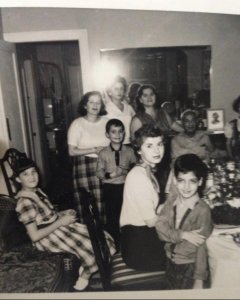
Like all loving mothers from the Arab World, my mother was an expert chef who slaved over a stove for hours in Chicago the same way she did with her mother over the tabboun in Bethlehem, Palestine where she was born.
Arabian food is not a fast food that is rushed to satisfy a hunger for carbs. It’s an art form.
Our Arab family dinner table that my mom prepared on Thanksgiving was spectacular.
It did include a Turkey, but that was merely the link to the American tradition.
The turkey was garnished with a bevy of Arab food recipes.
I remember the Thanksgiving table of my mother’s past dinners so vividly because each one was memorable.
The menu included grape leaves (wariq duwally) and zucchini (mashey) stuffed with rice, diced lamb and spices.
That was just the beginning of the meal. The Turkey was stuffed with rice and diced lamb, not breading. We had hummus, and homemade bread.
There was molokhiya and okra, and baba ghannouj, and Tabouli salad.
The dessert menu was extensive, too. We would have a tahini dip with sweet syrup that we could eat with sesame seed bread. She would spend days before Thanksgiving mixing crushed walnuts, pistachios with sugar and spices to fill the maamoul and the Qatayef.
My mother could easily have replaced the Turkey with a roasted lamb, but did not do so as a matter of respect to American culture.
My mom and dad loved their Arab culture but they also loved America. And they would share stories of growing up in Bethlehem and in Jerusalem, where my dad’s family lived until they were evicted by the Israelis in 1948.
The Arabian Turkey dinners would bring all those memories back to life in lavish stories filled with details and the names of their aunts, grandparents, cousins and ancestors.
The conversations and memories would go on for hours after the dinners, crowded into our home wistfully sighing for the reality of the experiences they left “back home.”
Politics and discussions about the Arab-Israeli wars were always on the agenda. But the atmosphere and the food put it in a less emotional context.
There was no hate. We grew up in a Jewish neighborhood in Chicago and my mother would often share the Arab food with the Jewish neighbors. They especially loved the falafel and the diced lamb and slivered almond stuffed kubbeh.
My mother and father came from big families with many sisters, brothers and cousins so they always made enough food to feed an army. Even with all the relatives over, there was always enough food for the next few days.
I am sure that every culture enjoys a similar experience with food bringing everyone together to rejoice in their family, their fortune and their lives.
Those Arab and American dinners are beautiful memories that put true meaning behind the spirit of Thanksgiving.
( Ray Hanania is an award winning former Chicago City Hall reporter. A political analyst and CEO of Urban Strategies Group, Hanania’s opinion columns on mainstream issues are published in the Southwest News Newspaper Group in the Des Plaines Valley News, Southwest News-Herald, The Regional News, The Reporter Newspapers. His Middle East columns are published in the Arab News. For more information on Ray Hanania visit www.Hanania.com or email him at rghanania@gmail.com.)
SUBSCRIBE BELOW


- Israelisnipers shooting and killing hospital workers in Gaza - December 11, 2023
- CAIR Condemns Israeli Executions of Wounded, Unarmed Palestinian in West Bank - December 11, 2023
- Arab and Muslim American voters face a “simple choice” between Biden’s inhumanity and Trump’s edgy politics - December 9, 2023













